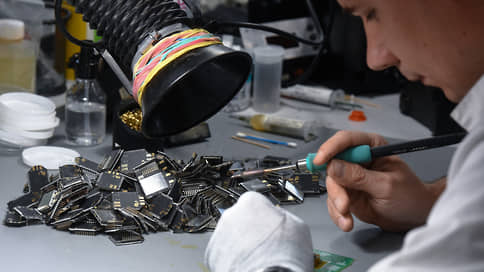A conveyor is being prepared for electronics – Newspaper Kommersant No. 185 (7386) dated 10/06/2022
[ad_1]

The government announced plans to launch a subsidy for mass production of civilian electronics. Thus, the authorities intend to increase the production of laptops, computers, tablets. In general, the Ministry of Industry and Trade intends to increase the amount of funds allocated to support the industry in 2023 from 144 billion rubles. up to 210 billion rubles. Experts and market participants consider the initiative appropriate: banks are not ready to issue loans for such projects due to high risks.
At the plenary session of the Microelectronics 2022 forum on October 3, Vasily Shpak, deputy head of the Ministry of Industry and Trade, announced the launch of a subsidy for “serial production of electronic equipment,” two sources who attended the meeting told Kommersant. According to one of them, such a measure implies support for companies that plan to produce electronics for the consumer segment – tablets, smartphones, laptops and personal computers.
Now companies can receive subsidies for the development of components or the launch of production, while the release of commercial batches of products is a capital-intensive process, and state support is also needed here, explains a top manager of a large Russian electronics manufacturer. The parameters of the subsidy, according to him, are not yet clear, “but the total amount of state support for the industry will increase from 144 billion rubles. in 2022 to 210 billion rubles. in 2023.” The measure is under development and will be launched after agreement with all interested departments and the government in the prescribed manner, Kommersant was told in the Ministry of Industry and Trade. The Ministry of Digital Development did not answer “Kommersant”.
Since the end of 2021, the Ministry of Digital Development, the Ministry of Industry and Trade and market participants have been discussing new mechanisms to support the development, production of computer technology and consumer electronics. Among them, for example, is the mechanism of end-to-end projects, according to the concept of which large consumers of electronics (for example, banks) will provide manufacturers with guaranteed demand for equipment that has not yet been produced: servers, software and hardware systems, data storage systems, etc. But the mechanism of end-to-end projects still not launched (see Kommersant of February 4).
Another measure to support the industry was the preferential lending mechanism for electronics manufacturers, established by the 407th government decree. According to it, companies can get a loan at a reduced rate. According to Kommersant’s interlocutor in the government, the loan amount should be from 3 to 100 billion rubles, and at the moment agreements have been concluded with a number of large Russian banks to issue 100 billion rubles. under this program until the end of 2022, in 2023 the Ministry of Digital Development expects to increase the volume of loans issued to 170 billion rubles. Kommersant’s sources in the IT market say that state support under the 407th resolution was requested, among other things, by Yadro and Aquarius.
In Russia, subsidies from the Ministry of Industry and Trade and the Ministry of Agriculture have proven themselves well, allowing banks and leasing companies to provide soft loans to borrowers in priority industries, compensate for part of capital costs, and also finance R&D, Aquarius noted: “Such a practice should be fully extended to microelectronics.”
Current support mechanisms make it possible to obtain a subsidy for the production of an experimental, rather than a commercial series of electronics, explains Maxim Koposov, director of the Promobit company (in 2022, developed the Bitblaze laptop): “At the same time, it is virtually impossible to get even a non-concessional loan for the production of commercial batches of electronics.” Banks are not ready to participate in such projects in the first place because demand is not guaranteed, he says.
The mechanism of subsidy for serial production of electronics, as conceived by the Ministry of Industry and Trade, should help Russian manufacturers of consumer electronics get on the shelves of retail chains in order to compete with foreign equipment, says a Kommersant interlocutor close to the ministry: “The subsidy will help reduce the cost of equipment, as well as quickly borrow market segments that, due to the departure of foreign companies, may not be occupied. He adds that, most likely, the key condition for obtaining a subsidy will be the localization of electronics production in Russia.
[ad_2]
Source link





